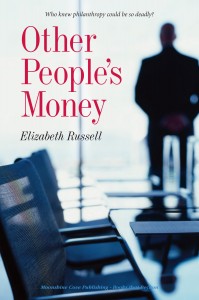 Let me start with a confession: I don’t read much fiction. As I travel the country advising philanthropies of all types and sizes, I find spare moments are scarce and there is always something more productive I feel I should do rather than read for pleasure.
Let me start with a confession: I don’t read much fiction. As I travel the country advising philanthropies of all types and sizes, I find spare moments are scarce and there is always something more productive I feel I should do rather than read for pleasure.
But when my colleague Betsey Russell recently sent me a copy of her new mystery novel, Other People’s Money, I was intrigued. It’s set in the world of philanthropy and I was curious to find out how she portrayed our field. Insights into a colleague’s thinking are always valuable, I reasoned, so I’m not completely wasting time.
Instead, I gained an insight I never expected: fiction can be a bridge for foundations to connect more deeply with the rest of the world.
Here in these pages, amid the twists and turns of a murder mystery and an ill-advised professional romance, is a look at the very human struggles that those behind the walls of foundations face every day. The internal conflicts that many program officers struggle with are presented in the character of Katie Nelson, the book’s protagonist, who is extremely frustrated with her board’s grantmaking decisions and the overall pace of change.
It’s not the first time I’ve heard these sentiments in real life, but definitely the first time I’ve seen them laid out so clearly and directly in print. And the beauty of having it in fiction is that no single foundation has to feel its imperfections exposed. It made me wonder what might happen if the rest of the world reads about some of the internal workings of philanthropy, about what they might think. What if they actually felt connected to a character inside a foundation? What if they read this book and began to have a better understanding of the roles foundations play and why they act like they do? What could this do to further the quest for transparency?
For years, businesses, leadership programs and others have used fictional case studies to get their participants to think through the “what ifs” of a situation. Since the majority of the country has no idea what foundations really are or what they do, this novel and others like it could serve as “case studies” of sorts to begin to imagine and understand the philanthropic world.
So, if you’re not a fiction reader, I encourage you to get a copy of Other People’s Money and see if you agree. And if you are a fiction or mystery lover you should get a copy as well – because even if my theory is wrong, I have to admit it’s a really good story!
Kris Putnam-Walkerly is a nationally recognized philanthropy advisor. Join her on Sunday April 26th in San Francisco at the National Network of Consultants to Grantmakers’ annual meeting and reception, where she will facilitate a panel discussion about philanthropy consulting and the latest issue of The Foundation Review.
© 2015 Kris Putnam-Walkerly. All rights reserved. Permission granted to excerpt or reprint with attribution.






